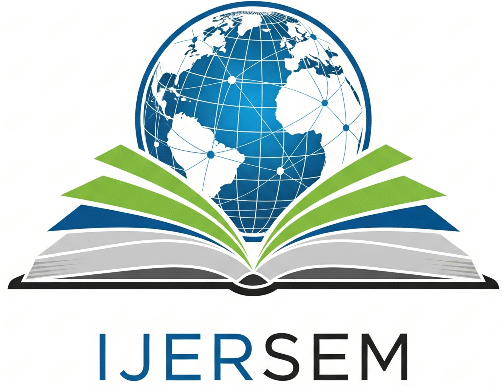International Journal of Emerging Research in Science, Engineering, and Management
Vol. 1, Issue 2, pp. 20-25, August 2025.
This work is licensed under a Creative Commons Attribution 4.0 International License.
Impact of Work-from-Home Policies on Employee Productivity in MSMEs
Narahari Vani
Venkata Lakshmi Keerthi K
M Poornima
Assistant Professor, Department of AI & DS, RMK Engineering College, Kavaraipettai, Tamil Nadu, India.
Assistant Professor, Department of ECE, Sri Venkateswara College of Engineering, Karakambadi, Tirupati, India.
Assistant Professor, Department of ECE, Sri Venkateswara College of Engineering, Karakambadi, Tirupati, India.
Abstract: The COVID-19 pandemic catalyzed a global shift in work culture, compelling businesses—including Micro, Small, and Medium Enterprises (MSMEs)—to adopt Work-from-Home (WFH) policies. While WFH has become a key component of flexible working arrangements in many large organizations, its impact on productivity within MSMEs remains underexplored. This paper investigates the implications of WFH policies on employee productivity in MSMEs, focusing on emerging markets. Drawing insights from empirical studies and recent literature, the paper examines the mediating role of HRM practices, generational preferences, managerial support, and digital infrastructure in shaping WFH outcomes. Findings suggest that effective telecommuting practices, aligned with employee needs and organizational support, can enhance employee well-being and productivity. However, challenges such as limited ICT adoption, varying levels of digital literacy, and infrastructural constraints hinder optimal outcomes, especially in rural or resource-constrained settings. The study contributes to the growing discourse on sustainable workforce models in MSMEs by offering policy recommendations and identifying future research directions.
Keywords: Digital Transformation, Employee Productivity, Micro Small and Medium Enterprises, Remote Work, Work-from-Home.
References:
- D. Dutta, P. Srivastava, N. Z. Memon, and C. Vedak, “Inclusive and sustainable economic growth for MSME firms: examining the impact of sustainable HRM practices on women’s well-being,” International Journal of Manpower, Sep. 2024, doi: 10.1108/ijm-12-2023-0750.
- D. Smite, N. B. Moe, J. Hildrum, J. Gonzalez-Huerta, and D. Mendez, “Work-from-home is here to stay: Call for flexibility in post-pandemic work policies,” Journal of Systems and Software, vol. 195, p. 111552, Oct. 2022, doi: 10.1016/j.jss.2022.111552.
- S. Kumar, U. Goel, P. Joshi, and A. Johri, “Factors affecting Information & Communication Technology (ICT) adoption among MSMEs,” Journal of Open Innovation Technology Market and Complexity, vol. 10, no. 1, p. 100205, Jan. 2024, doi: 10.1016/j.joitmc.2023.100205.
- E. N. Yunus, E. Ernawati, E. Nuraini, and K. Yuniarti, “Post-Crisis growth: resource orchestration, innovation, and diversification in MSMEs,” Journal of Open Innovation Technology Market and Complexity, vol. 11, no. 2, p. 100570, Jun. 2025, doi: 10.1016/j.joitmc.2025.100570.
- P. L. Samputra and M. Alfarizi, “Can advanced society 5.0 technology create economic and social value for millennial and generation Z MSMEs in Surabaya, Indonesia? An economic resilience perspective,” Asia Pacific Management Review, p. 100355, Mar. 2025, doi: 10.1016/j.apmrv.2025.100355.
- A. S. Satpathy, S. K. Sahoo, A. Mohanty, and P. P. Mohanty, “Strategies for enhancements of MSME resilience and sustainability in the post-COVID-19 era,” Social Sciences & Humanities Open, vol. 11, p. 101223, Nov. 2024, doi: 10.1016/j.ssaho.2024.101223.
- M. R. Sarker, M. A. R. Sarkar, M. J. Alam, I. A. Begum, and H. Bhandari, “Systems thinking on the gendered impacts of COVID-19 in Bangladesh: A systematic review,” Heliyon, vol. 9, no. 2, p. e13773, Feb. 2023, doi: 10.1016/j.heliyon.2023.e13773.
- K. Sisay, S. Molla, L. Mekonnen, and Z. Gadisa, “Nexus between business development service and women entrepreneurs’ performance: Implication for MSMEs growth and inclusive economic development in Ethiopia,” Journal of Open Innovation Technology Market and Complexity, p. 100514, Mar. 2025, doi: 10.1016/j.joitmc.2025.100514.
- A. Timsal and M. Awais, “Flexibility or ethical dilemma: an overview of the work from home policies in modern organizations around the world,” Human Resource Management International Digest, vol. 24, no. 7, pp. 12–15, Oct. 2016, doi: 10.1108/hrmid-03-2016-0027.
- D. Peón, V. Singh, and J. Rodríguez-Álvarez, “Impact of COVID mobility measures on the financial performance of small business in rural areas of Spain,” Journal of Rural Studies, vol. 118, p. 103687, Apr. 2025, doi: 10.1016/j.jrurstud.2025.103687.
- I. Cheratian, S. Goltabar, H. F. Gholipour, and M. R. Farzanegan, “Finance and sales growth at the firms level in Iran: Does type of spending matter?,” Research in International Business and Finance, vol. 67, p. 102142, Oct. 2023, doi: 10.1016/j.ribaf.2023.102142.
- M. Omer, M. Kaiser, D. Ingrassia, T. Redlich, M. Moritz, and J. Wulfsberg, “Inclusive Production Capacity Building for MSMEs: Designing Open Source Machine Tools and the OLSK approach,” Procedia CIRP, vol. 128, pp. 758–763, Jan. 2024, doi: 10.1016/j.procir.2024.04.023.
- M. M. Shanmugapriya, “A Study on Business Use of Digital Platforms with Special Reference to Chennai City,” International Journal of Emerging Research in Engineering, Science, and Management, vol. 2, no. 3, pp. 10-15, 2023. doi: 10.58482/ijeresm.v2i3.3.
- Satish Dhoke, “Digital Literacy and E-learning Adoption Among Commerce Students: Challenges and Opportunities in Bhokardan,” International Journal of Emerging Research in Engineering, Science, and Management, vol. 4, no. 1, pp. 41-48, 2025. doi: 10.58482/ijeresm.v4i1.6.
